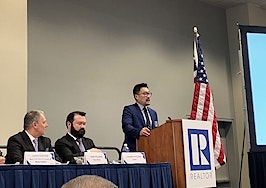In these times, double down — on your skills, on your knowledge, on you. Join us Aug. 8-10 at Inman Connect Las Vegas to lean into the shift and learn from the best. Get your ticket now for the best price.
The National Association of Realtors is considering requiring its 1.5 million members to complete two hours of fair housing training every three years, starting in January 2025.
On Monday afternoon, the trade group’s Membership Policy and Board Jurisdiction Committee, which oversees NAR membership requirements, voted to approve a fair housing training proposal at NAR’s midyear conference, the Realtors Legislative Meetings, in Washington D.C.
That vote sends the proposal to the NAR board of directors, which will meet on Thursday.
Earlier in the day, NAR’s Association Executives Committee and Fair Housing Policy Committee voted to support the proposal as it heads to the board.
The proposal was put forward by a workgroup on fair housing education that the Membership Policy and Board Jurisdiction Committee appointed last year to review a recommendation from the Fair Housing Policy Committee to consider whether Realtors should be required to complete regular fair housing training as a condition of membership.
Currently, the only training NAR requires of its members is a 2.5-hour Realtor Code of Ethics training every three years. NAR debuted its implicit bias certificate course, Bias Override, a year ago, on top of its Fairhaven fair housing training launched in 2020. Both are voluntary.

Greg Kiely
“After much debate and discussion, together we crafted the following recommendations: to require two hours of fair housing training for members every three years, coinciding with the [Realtor] Code of Ethics training schedule,” Greg Kiely, the workgroup’s chair, told the Association Executives Committee Monday morning.
According to Kiely, NAR’s Bias Override training and NAR’s At Home With Diversity training, as well as equivalent courses provided by state and local associations would satisfy the requirement. Fair housing courses approved by state licensing authorities for an existing statewide fair housing requirement would also qualify provided that the courses meet the two-hour minimum and certain learning objectives.
The workgroup also recommended that Fairhaven meet the requirement as a free option, but only after it is revised “to make it longer and more robust in order to be able meet the two-hour minimum and to meet learning objectives,” Kiely said.
The text of the fair housing training proposal and its learning objectives will be available at the board of directors meeting, NAR told Inman.
The workgroup proposed that the requirement go into effect in January 2025 “in order to avoid disrupting the current code of ethics cycle and give associations and members time to prepare,” Kiely added.
The requirement would likely be tracked through M1, NAR’s member engagement platform, similar to how the ethics training requirement is tracked, according to Kiely.
He said the workgroup had considered whether to make fair housing training voluntary, but ultimately decided against that idea.
“The workgroup feels this is a necessary and reasonable requirement of NAR,” Kiely said.
“The work group did consider whether highly incentivizing voluntary training would be a preferable option, but ultimately we concluded that, absent a requirement, the members that would most benefit from fair housing training would arguably be the least likely to attend a voluntary training.”
He noted that hundreds of thousands of Realtors have little or no training in fair housing.
“If we as an association are to truly model a higher standard, we cannot afford to fall short in this regard,” Kiely said.
“Education is the pillar of NAR’s Fair Housing ACT plan. We feel this as an opportunity for our actions match our words.”
Tessa Hultz, CEO of the Long Island Board of Realtors, spoke in favor of the proposal at the Association Executives Committee meeting. She is the committee’s liason to the Fair Housing Policy Committee this year. Her association has also been dealing with repercussions from a groundbreaking 2019 investigation from Newsday into discriminatory real estate practices by Long Island brokerages.
“I’m actually going to give you my comments as an [association executive] in the state of New York for the last four years,” Hultz told the committee, prompting knowing laughter from attendees.

Tessa Hultz
“Here’s what I can tell you: This is for January 2025. In New York we did not get a year and a half to cure up. The state told us that you will now start doing cultural competency. You will now start doing implicit bias, but we’re not going to tell you what the learning objectives are until three months before the deadline. I recently had to get 60,000 Realtors, about, through all of these classes.
“So this is preventative. I will tell you the cure does not come to this committee for approval. The cure comes from our regulators and it comes hard and fast.”













